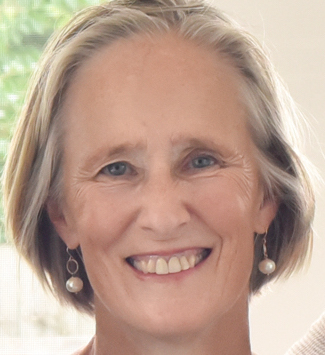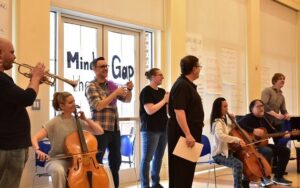All that enthusiasm and nowhere to go. That’s what happens sometimes when new Braver Angels volunteers get certified as workshop moderators – and then find themselves waiting to be put to work on a Skills for Bridging the Divide or Depolarizing Within event. It can be discouraging, and it’s a waste of eager talent.
Maggie Bayless is here to help fix that. Together with a handful of colleagues on the training team that trains and supports Braver Angels’ workshop moderators, she is acutely aware of what’s needed to get volunteers contributing as soon as they can. “Energy is high when people first get involved,” she says. “We don’t want to lose them because they don’t have an opportunity to engage.”
It’s not just about finding workshops that need moderators. “Especially in an organization staffed by volunteers, you need to have systems documented in ways that new people can come in and pick up the ball,” explains Maggie. By “systems” she means the processes and procedures and templates that enable newbies to figure out how things work. “Things need to be simple enough that people can get up to speed and feel they’re contributing, and stay engaged,” she adds.
One example of the effective systems now in place: the moderator training syllabus, which leads aspiring moderators, step by step, through the requirements for training. (There are three phases: the first is geared to core [on-land] training, which includes role-playing and presenting of a mock workshop; the second extends to online moderating, meaning that trainees learn how to show their screens, manipulate slides, and more; and a third phase that is designed to provide ongoing training for qualified moderators.) The syllabus initiative was led by Braver Angel leaders Lynn Heady and Dee Endelman.
Then there is Moderator Office Hours, a system in which monthly sessions give people a place to go to ask and answer questions. “We’ve tried to build in some opportunities for people to talk to each other,” she explains. “Sometimes just getting an answer over the phone clears it all up.”
Maggie was part of the workgroup that recently updated the training syllabus. That work morphed into working with Mary Thomas-Vallens and April Chatham Carpenter to develop a structure for assembling and running monthly forums to give moderators a chance to learn from each other.
And underpinning all of those processes and templates are the technical tools that can help ensure that the pertinent data is generated, stored, readily retrieved, and widely communicated as needed. “Martin Hunke handles the technical side,” notes Maggie. “He coordinates all of the training.”
Right now, the team could use more tech-savvy volunteers – ideally, people who know their way around the innards of web pages and ideally also have some understanding of what’s involved with training. (If that’s you or someone you know, please get in touch with Maggie at: mbayless@braverangels.org)
Maggie, Blue, is one of those Braver Angels who signed up after reading David Brooks’ 2018 column in the New York Times. “Like many people, I’d been thrown for a loop by the 2016 election results,” she says. “I felt a lot of despair about the state of the country. I felt like I needed to do something and reached out to a lot of people I knew. But the tone of those conversations made me feel worse, not better.”
So finding Braver Angels was like finding a group of long-lost friends. Maggie fell naturally into moderating – a role she continues with today – but it wasn’t long before her background, running her own business-to-business training company, got her invited into a group that was working on updating the training for moderators. “It felt like a logical way to contribute,” she says.
When Covid arrived, her company’s business model –based wholly on in-person training – took a major hit. She and her team worked at warp speed to rebuild the business around training via Zoom, and quite quickly, it came back. At the same time, Maggie was stepping back from a full-time role at the company she had founded. “Now I’m doing just the projects I want to do – and Braver Angels training is one of them,” she says. (She’s also on the board of her local Habitat for Humanity in Ann Arbor, Michigan, and works pro bono for other non-profits in town.)
With more time to spare, Maggie re-engaged with Braver Angels at the national level by getting certified as a Zoom event manager and working as a member of the technical team on a wide range of virtual workshops. As she puts it, she just started showing up for meetings, attending as many as she could, meeting more and more active Braver Angels – and building a wide and deep network of contacts across the organization.
And that point – about immersion by “just showing up” – is one that Maggie communicates to newly trained workshop moderators who are looking for their first gig. “It’s about looking around – looking for opportunities to attend meetings, even if it’s just to listen in. People reach out to people they know,” she notes. “I get called [to work on workshop teams] because people know me.”
But isn’t that a clunky way for event organizers and moderators to find each other? True. Maggie explains that there is currently no central clearing-house to meet that need, but work is under way to help that to happen; Martin Hunk and Dan Carnese are working on a software tool that will help.
Maggie and her fellow moderator trainers also continue to look for ways that experienced moderators can support newbies. She envisions a vibrant community where every moderator feels that he or she is connected. “That would be really exciting,” she says.
Maggie Bayless is getting out of Braver Angels exactly what she was looking for when she joined: a rich nationwide network of individuals, Red as well as Blue, who are committed to the work of depolarization. So on those days when things seem bleak, she can remind herself: “There are all of these people who feel as I do, that there’s a way to make productive change.”
That’s a message that should go deep with every Braver Angel – especially those who want to step forward as volunteers.





1 thought on “Colleague of the Week: Maggie Bayless”
So great to see Maggie featured this week. She’s one of the workshop staff I had the pleasure of working with when I joined one of the National workshop teams to deliver the Blue-leaning versioin of “Skills for Bridging the Divide” workshop. She’s a super team member, dedicated learning professional and always enthusiastic and encouraging in her approach. Thanks for being a terrific model for all of us, Maggie!